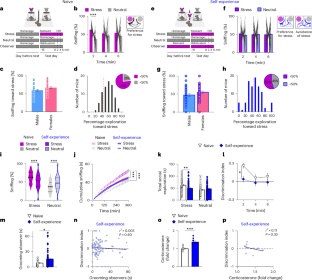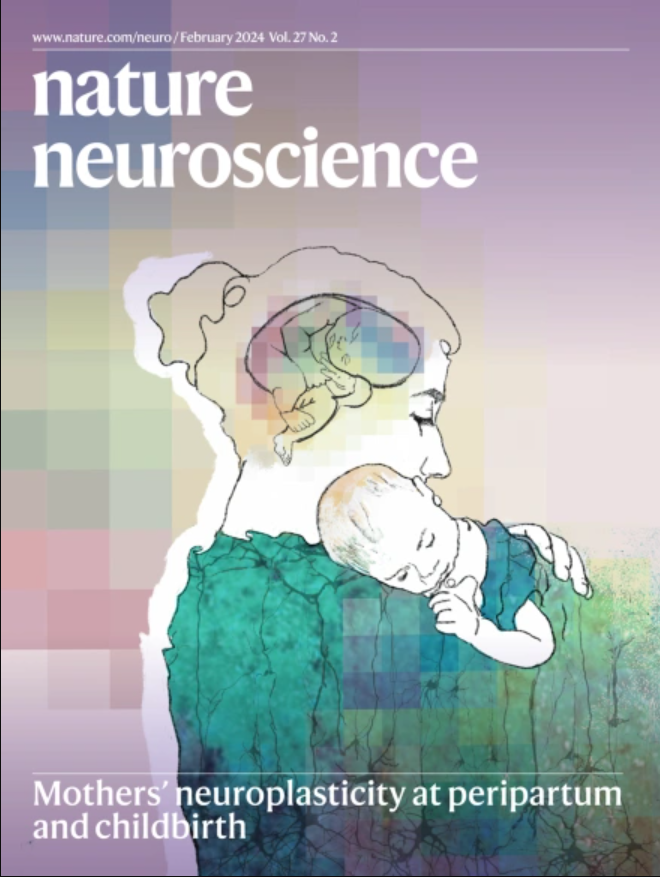Self-experience of a negative event alters responses to others in similar states through prefrontal cortex CRF mechanisms
IF 21.2
1区 医学
Q1 NEUROSCIENCES
引用次数: 0
Abstract
Our own experience of emotional events influences how we approach and react to others’ emotions. Here we observe that mice exhibit divergent interindividual responses to others in stress (that is, preference or avoidance) only if they have previously experienced the same aversive event. These responses are estrus dependent in females and dominance dependent in males. Notably, silencing the expression of the corticotropin-releasing factor (CRF) within the medial prefrontal cortex (mPFC) attenuates the impact of stress self-experience on the reaction to others’ stress. In vivo microendoscopic calcium imaging revealed that mPFC CRF neurons are activated more toward others’ stress only following the same negative self-experience. Optogenetic manipulations confirmed that higher activation of mPFC CRF neurons is responsible for the switch from preference to avoidance of others in stress, but only following stress self-experience. These results provide a neurobiological substrate underlying how an individual’s emotional experience influences their approach toward others in a negative emotional state. Maltese et al. show in mice that experiencing an adverse event affects future interaction with others experiencing the same stressor. These self-experience socioemotional reactions are orchestrated by the corticotropin-releasing factor system in the medial prefrontal cortex.


消极事件的自我体验通过前额叶皮质CRF机制改变了对相似状态下他人的反应
我们自己的情感经历会影响我们如何处理和应对他人的情绪。在这里,我们观察到,只有当老鼠以前经历过同样的厌恶事件时,它们才会对压力下的其他老鼠表现出不同的个体间反应(即偏好或回避)。这些反应在雌性中依赖于发情,在雄性中依赖于支配。值得注意的是,抑制内侧前额叶皮质(mPFC)内促肾上腺皮质激素释放因子(CRF)的表达可以减弱应激自我体验对他人应激反应的影响。体内钙微内窥镜成像显示,mPFC CRF神经元只有在同样的消极自我体验后才会对他人的压力产生更多的激活。光遗传学操作证实,mPFC CRF神经元的高激活负责在压力下从偏好到回避他人的转换,但仅在压力自我体验之后。这些结果提供了一个神经生物学基础,揭示了一个人的情绪经历如何影响他们在消极情绪状态下对待他人的方式。
本文章由计算机程序翻译,如有差异,请以英文原文为准。
求助全文
约1分钟内获得全文
求助全文
来源期刊

Nature neuroscience
医学-神经科学
CiteScore
38.60
自引率
1.20%
发文量
212
审稿时长
1 months
期刊介绍:
Nature Neuroscience, a multidisciplinary journal, publishes papers of the utmost quality and significance across all realms of neuroscience. The editors welcome contributions spanning molecular, cellular, systems, and cognitive neuroscience, along with psychophysics, computational modeling, and nervous system disorders. While no area is off-limits, studies offering fundamental insights into nervous system function receive priority.
The journal offers high visibility to both readers and authors, fostering interdisciplinary communication and accessibility to a broad audience. It maintains high standards of copy editing and production, rigorous peer review, rapid publication, and operates independently from academic societies and other vested interests.
In addition to primary research, Nature Neuroscience features news and views, reviews, editorials, commentaries, perspectives, book reviews, and correspondence, aiming to serve as the voice of the global neuroscience community.
 求助内容:
求助内容: 应助结果提醒方式:
应助结果提醒方式:


